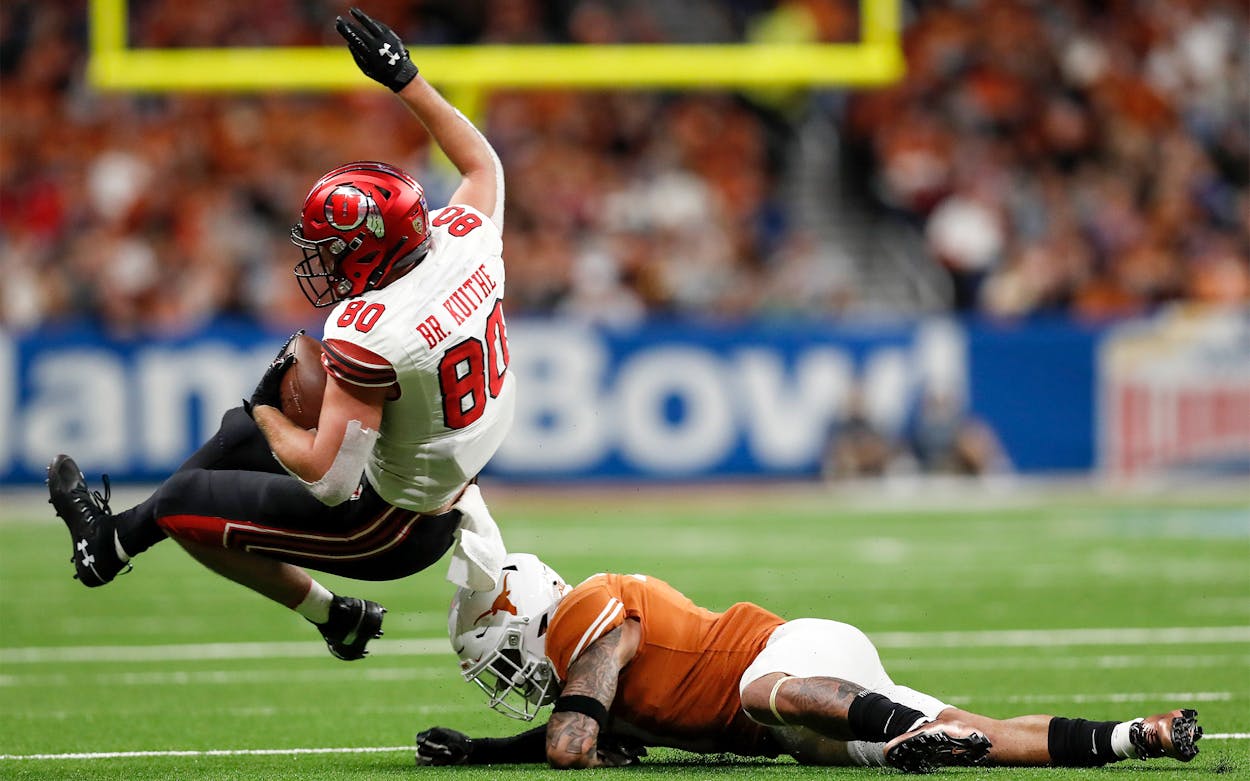On Saturday, despite staging a thrilling four-overtime near-comeback, the University of Texas Longhorns football team lost its second straight game to an unranked rival. At a Monday press conference, in addition to speaking to the team’s shortcomings on the field against Oklahoma, head coach Tom Herman addressed another controversy surrounding the Longhorns: the ongoing debate over the school song, “The Eyes of Texas.” In June, dozens of UT athletes signed a letter asking the university to address racist aspects of its history by, among other things, changing its spirit song to something without the troubled history of “The Eyes of Texas.”
The university met some of the players’ requests but refused to budge on “The Eyes of Texas.” Many fans, alumni, and financial supporters of the program have a deep attachment to the song. Despite its origin in a minstrel show that included white performers in blackface, some of them argue that the song’s lyrics are not racist.
The dispute has been pulled into a larger debate in which one side’s campaign for racial justice is seen by its critics as an assault on beloved traditions. A similar struggle has been a part of sports since Colin Kaepernick began kneeling during the national anthem in 2016. As a result, the UT administration has struggled to walk a fine line, trying to avoid a backlash among those fans by working out a compromise with the players.
For much of the summer, and the first several weeks of the season, UT tried to run out the clock on the controversy. Fans still heard “The Eyes of Texas” before and after football games, but athletes weren’t required to stand on the field while it was played; meanwhile, UT formed a committee to “contextualize” the history of the song. The university renamed its football field to honor Earl Campbell and Ricky Williams—two Black UT football legends—and changed the name of the Physics, Math, and Astronomy Building to remove the name of a segregationist professor. It also promised additional “context and history” in lieu of further building renamings or the removal of a statue of segregationist and former Texas governor James Hogg. The compromise, while rickety, held for the first few weeks of the season.
Now, though, the trajectory of the Longhorns has shifted. Entering week three of the season, the team had delivered on high fan hopes, rising to ninth in the AP poll on the leadership of Herman and the arm of senior quarterback Sam Ehlinger. But following back-to-back losses, the team is now unranked, and when “The Eyes of Texas” was played in the stadium at the end of Saturday’s Red River Rivalry game, the team was in the locker room—all, apparently, but Ehlinger, who in a widely shared photo stood alongside coaches and staff with his “horns up” hand in the air.
Longhorns QB Sam Ehlinger remained on the field for "The Eyes of Texas" school song after the four overtime loss to Oklahoma. https://t.co/Dmiqp1fjrs pic.twitter.com/EFS3uS3k6S
— KXAN News (@KXAN_News) October 10, 2020
Fans questioned what Ehlinger’s decision to stay on the field meant for the Longhorns. Was the locker room divided? Had Herman lost the team? (According to 247 Sports, it may just have been that some players didn’t expect to hear the song after the game at the Cotton Bowl in Dallas, since OU’s alma mater was played first, and UT’s band wasn’t present.) Herman, speaking after the game, told reporters, “Some members of our program have concerns and aren’t comfortable participating at this time, and I respect that.”
In his weekly email to fans on Wednesday, Herman’s boss, UT athletics director Chris Del Conte, had a different perspective on how to respect players who were uncomfortable participating. “I have had many conversations with our head coaches outlining my expectations that our teams show appreciation for our university, fans, and supporters by standing together as a unified group for ‘The Eyes,’ while we work through this issue,” Del Conte wrote.
The issue around “The Eyes of Texas” isn’t one of wins and losses, but it’s also impossible to separate the success of a team on the field from the issues it experiences off of it. “Winning fixes everything” is one of the oldest clichés in sports for a reason: fans will forgive most anything if they get to watch their team compete for a championship, and players will come together to back up teammates they don’t get along with if they see results on the field. When hopes for the season were high at UT, players and fans seemed to navigate to an uneasy truce around “The Eyes of Texas.” Now that the team’s prospects aren’t looking so bright, though, Del Conte and the university have less reason to try to satisfy the players on the 2020 Longhorns team—they won’t be there forever, after all—and more reason than ever to give the fans who want to see the song’s treatment unchanged some sort of victory to celebrate. They, after all, will be around much longer than today’s players.
There are plenty of people who root for the Longhorns and who agree with the players about “The Eyes of Texas.” But Del Conte’s expectation that athletes should “show their appreciation” for “fans and supporters” by standing on the field during the song draws a sharp line, showing that those aren’t the fans he is eager to please.
This year—as for most of the past decade—UT football fans won’t get to watch their team compete for a national championship. They won’t get to watch their quarterback go for the Heisman. They won’t get to see a rising-star head coach on the verge of breaking through to the sport’s top tier. This year, they didn’t even get to watch them beat OU. Instead, they will get to watch the team’s players, including the Black athletes who’ve expressed their discomfort with the song, asked to stand in deference to fans, including those who’ve aggressively pushed back against their call for racial justice.








